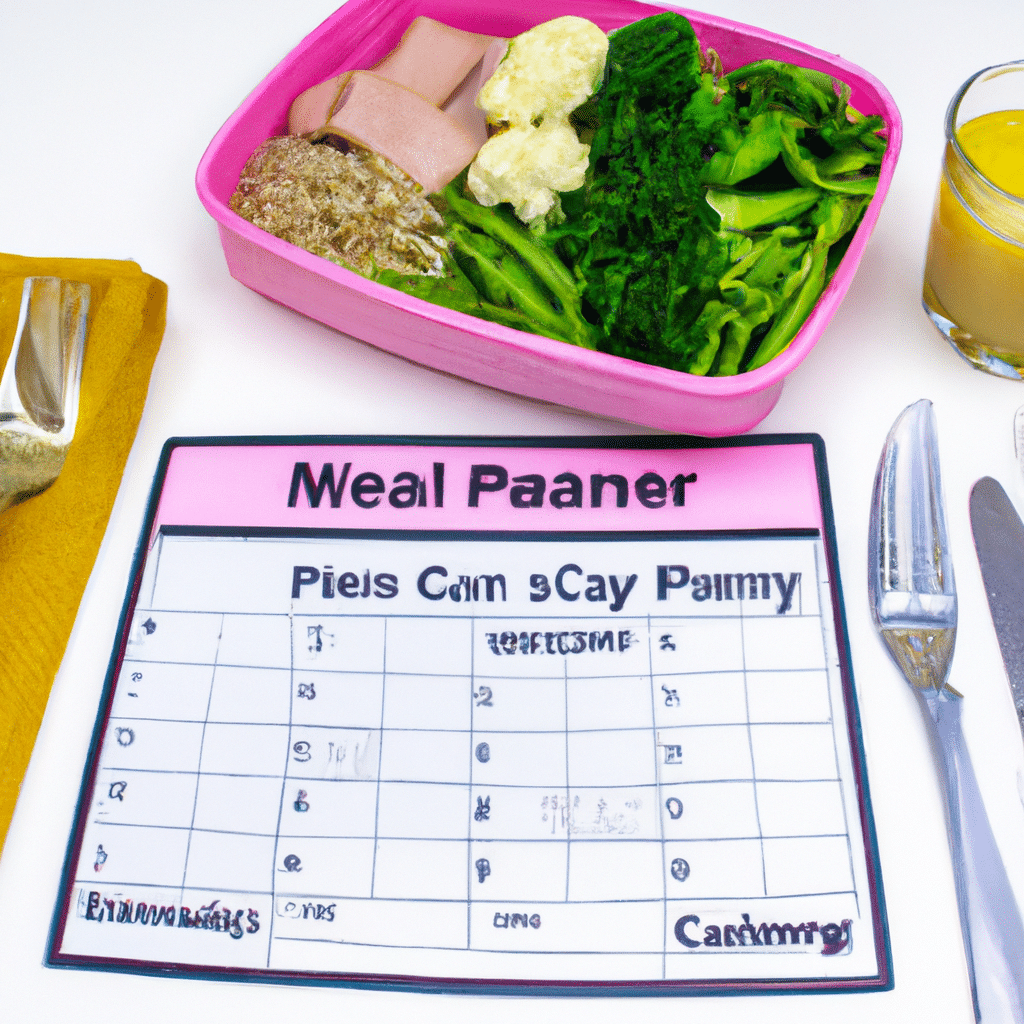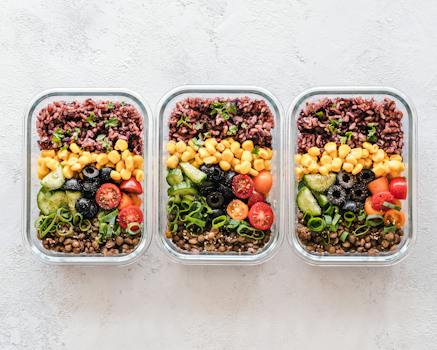
When it comes to battling cancer, proper nutrition plays a vital role in supporting the body’s overall health and well-being. Creating a nutritious meal plan tailored specifically for cancer patients is crucial in providing the essential nutrients and energy needed to combat the disease, manage treatment side effects, and promote recovery. This article delves into the importance of developing a well-balanced and personalized meal plan, highlighting key considerations, food choices, and strategies to ensure optimal nutrition for cancer patients.
- 1. Introduction
- 1.1. Understanding the importance of a healthy meal plan for cancer patients
- 1.2. Benefits of a well-balanced diet during cancer treatment
- 1.3. Consulting with a healthcare professional before implementing a meal plan
- 2. Key Components of a Healthy Meal Plan
- 2.1. Incorporating a variety of fruits and vegetables
- 2.2. Choosing lean sources of protein
- 2.3. Including whole grains and high-fiber foods
- 2.4. Limiting processed and sugary foods
- 2.5. Staying hydrated with water and other fluids
- 3. Meal Planning Tips for Cancer Patients
1. Introduction
Creating a nutritious meal plan is essential for cancer patients as it can help support their overall health and well-being during their treatment journey. A well-balanced diet can provide the necessary nutrients and energy needed to maintain strength, manage side effects, and improve the body’s ability to heal. In this article, we will discuss the importance of a nutritious meal plan for cancer patients and provide helpful tips and guidelines to create one.
1.1. Understanding the importance of a healthy meal plan for cancer patients
A healthy meal plan plays a crucial role in the overall well-being of cancer patients. Proper nutrition is essential for these individuals, as it can help manage symptoms, improve their quality of life, and even enhance the effectiveness of cancer treatments. Cancer and its treatments can often lead to various side effects such as loss of appetite, nausea, taste changes, and difficulty swallowing. Therefore, creating a nutritious meal plan tailored specifically to the needs of cancer patients becomes paramount.
By providing the body with the right nutrients, a healthy meal plan can help cancer patients maintain their strength and energy levels. It can also aid in rebuilding tissues, supporting the immune system, and preventing malnutrition. Additionally, a well-balanced diet can contribute to managing treatment side effects, promoting a healthy weight, and reducing the risk of infections and complications.
Understanding the importance of a healthy meal plan for cancer patients is crucial for healthcare professionals and caregivers. By implementing a well-thought-out meal plan, they can offer support and improve the overall health outcomes of cancer patients. In the following sections, we will delve deeper into the process of creating a nutritious meal plan that addresses the unique dietary needs of individuals battling cancer.
1.2. Benefits of a well-balanced diet during cancer treatment
A well-balanced diet plays a crucial role in supporting cancer patients during their treatment journey. Proper nutrition is vital for maintaining a strong immune system, promoting healing, and managing side effects of cancer therapies. By providing essential nutrients, a well-balanced diet can help patients cope with the physical and emotional challenges they may face.
During cancer treatment, the body often requires extra energy and nutrients to combat the disease and maintain overall health. A well-balanced diet ensures that patients receive adequate amounts of proteins, carbohydrates, fats, vitamins, minerals, and fluids. These nutrients help in repairing damaged tissues, boosting energy levels, and reducing the risk of infections.
Moreover, a nutritious diet can help manage common side effects of cancer treatment. For example, certain foods can alleviate nausea, while others can prevent or reduce mouth sores. Adequate hydration and fiber intake can help regulate bowel movements and prevent constipation, a common issue among cancer patients.
In addition to physical benefits, a well-balanced diet also plays a crucial role in improving the mental well-being of cancer patients. Eating nutritious meals can enhance mood, boost morale, and provide a sense of control and empowerment during a challenging time.
Overall, adopting a well-balanced diet during cancer treatment is essential for optimizing health, managing side effects, and supporting the body’s ability to fight the disease. By working closely with healthcare professionals and incorporating the right foods into their meal plans, cancer patients can improve their overall well-being and enhance their chances of successful treatment outcomes.
1.3. Consulting with a healthcare professional before implementing a meal plan
Consulting with a healthcare professional before implementing a meal plan is crucial for cancer patients. A healthcare professional, such as a registered dietitian or oncology nurse, can provide personalized guidance and recommendations based on the individual’s specific needs and medical condition. By consulting with a healthcare professional, cancer patients can ensure that their meal plan is tailored to their unique situation, taking into account any dietary restrictions, treatment side effects, and nutritional requirements. This collaboration helps in creating a nutritious meal plan that supports the overall health and well-being of the patient during their cancer journey.
2. Key Components of a Healthy Meal Plan
A key component of a healthy meal plan for cancer patients is to focus on nutrient-dense foods that provide essential vitamins, minerals, and antioxidants. These help support the immune system and promote overall well-being. A well-balanced meal should include a variety of fruits, vegetables, whole grains, lean proteins, and healthy fats.
Fruits and vegetables are rich in antioxidants and fiber, which can help reduce inflammation and provide protection against certain types of cancer. Including a colorful mix of fruits and vegetables in the diet ensures a wide range of nutrients.
Whole grains such as brown rice, quinoa, and whole wheat bread provide complex carbohydrates and fiber, which help stabilize blood sugar levels and promote bowel regularity. They also offer important vitamins and minerals.
Lean proteins like chicken, fish, tofu, and legumes are essential for rebuilding tissues, maintaining muscle mass, and supporting the immune system. It is important to choose lean sources of protein to reduce the intake of saturated fats.
Healthy fats found in foods like avocados, nuts, seeds, and olive oil provide essential fatty acids that support brain health and help absorb fat-soluble vitamins. Including these fats in the diet can also help reduce inflammation.
In addition to these key components, it is important for cancer patients to stay hydrated by drinking enough water throughout the day. Adequate hydration supports digestion, helps transport nutrients, and aids in the elimination of waste products.
Creating a nutritious meal plan for cancer patients involves incorporating these key components in appropriate portions to meet their individual needs. Consulting with a registered dietitian can be beneficial in developing a personalized meal plan that addresses specific dietary requirements and preferences.
2.1. Incorporating a variety of fruits and vegetables
Incorporating a variety of fruits and vegetables is essential for a healthy meal plan. These nutrient-rich foods provide a wide range of vitamins, minerals, and antioxidants that are crucial for maintaining overall health and well-being. When it comes to creating a nutritious meal plan for cancer patients, it becomes even more important to focus on including a diverse selection of fruits and vegetables.
Fruits and vegetables are packed with essential nutrients that can help support the immune system, reduce inflammation, and improve overall nutritional status. They are also rich in dietary fiber, which aids in digestion and helps prevent constipation, a common side effect of cancer treatments.
When selecting fruits and vegetables, it is advisable to choose a variety of colors. Different colors indicate different nutrient profiles, so incorporating a rainbow of fruits and vegetables ensures a wide range of health benefits. For example, red and orange fruits and vegetables like tomatoes, carrots, and sweet potatoes are rich in beta-carotene and vitamin C, which can help boost immune function. Leafy green vegetables like spinach, kale, and broccoli are excellent sources of folate, iron, and other important vitamins and minerals.
Including fruits and vegetables in different forms is also beneficial. Fresh, frozen, or canned options are all acceptable, as long as they are prepared without added sugars or excessive sodium. It is important to wash fresh produce thoroughly to remove any potential contaminants.
In summary, incorporating a variety of fruits and vegetables into a meal plan for cancer patients is essential for providing the necessary nutrients to support their health and well-being. By including a rainbow of colorful options and choosing different forms of fruits and vegetables, patients can ensure they are getting a diverse array of vitamins, minerals, and antioxidants that can help optimize their nutritional intake and support their overall recovery process.
2.2. Choosing lean sources of protein
Choosing lean sources of protein is an important aspect of creating a nutritious meal plan for cancer patients. Protein plays a crucial role in repairing and building tissues, strengthening the immune system, and maintaining overall health. However, not all sources of protein are created equal. When selecting lean sources of protein, it is essential to consider their nutritional value and impact on cancer patients’ well-being.
Lean sources of protein contain minimal amounts of unhealthy fats and cholesterol while providing essential nutrients. Fish, such as salmon, tuna, and trout, are excellent lean protein options as they are rich in omega-3 fatty acids and high-quality protein. These fatty acids have anti-inflammatory properties and can help reduce the side effects of cancer treatments. Poultry, like skinless chicken and turkey, is also a lean protein choice that provides essential amino acids necessary for cell repair and growth.
In addition to fish and poultry, legumes and beans are another great source of lean protein. Black beans, lentils, and chickpeas are not only high in protein but also rich in fiber, vitamins, and minerals. They can be easily incorporated into various dishes, such as soups, salads, and stews. Tofu and other soy-based products are suitable options for individuals following a plant-based diet or those who prefer vegetarian sources of protein.
When creating a meal plan for cancer patients, it is crucial to choose lean sources of protein that are easy to digest and gentle on the stomach. Grilled, baked, or steamed preparations are preferable over fried or heavily seasoned options. It is also essential to consider individual dietary restrictions and preferences, as well as any specific recommendations from healthcare professionals.
By incorporating lean sources of protein into a meal plan, cancer patients can ensure they are getting the necessary nutrients to support their treatment and overall well-being. It is advisable to consult with a registered dietitian or nutritionist to create a personalized meal plan that meets individual needs and promotes optimal health during cancer treatment.
2.3. Including whole grains and high-fiber foods
Including whole grains and high-fiber foods is an essential component of a healthy meal plan for cancer patients. Whole grains such as brown rice, quinoa, and whole wheat bread provide a good source of carbohydrates as well as important nutrients like fiber, vitamins, and minerals. Fiber is particularly beneficial for cancer patients as it helps to regulate bowel movements and prevent constipation, a common side effect of cancer treatments.
High-fiber foods such as fruits, vegetables, legumes, and nuts should also be included in the meal plan. These foods not only provide fiber but also offer a wide range of vitamins, minerals, and antioxidants that are important for overall health and immune function. Additionally, they can help to promote satiety and prevent overeating, which is important for cancer patients who may experience changes in appetite or weight loss.
Incorporating whole grains and high-fiber foods into a meal plan can be done in various ways. For instance, cancer patients can opt for whole grain cereals or oatmeal for breakfast, whole wheat bread or wraps for sandwiches, and brown rice or quinoa as a side dish for lunch or dinner. Including a variety of fruits and vegetables as well as legumes and nuts as snacks or in salads can further enhance the nutritional value of the meal plan.
Overall, including whole grains and high-fiber foods in a meal plan for cancer patients is crucial for providing essential nutrients, promoting bowel regularity, and supporting overall health and well-being during cancer treatment.
2.4. Limiting processed and sugary foods
Limiting processed and sugary foods is essential when creating a nutritious meal plan for cancer patients. Processed foods are typically high in unhealthy fats, sodium, and preservatives, which can negatively impact the body’s immune system and overall health. Additionally, sugary foods can lead to inflammation and can contribute to weight gain, which is often undesirable for cancer patients.
Instead, a healthy meal plan should focus on incorporating fresh, whole foods that are rich in nutrients. This includes a variety of fruits and vegetables, lean proteins, whole grains, and healthy fats. These foods provide essential vitamins and minerals, antioxidants, and fiber, which can help support the immune system and overall well-being.
By limiting processed and sugary foods and emphasizing whole, nutrient-rich ingredients, cancer patients can optimize their meal plans for better health outcomes.
2.5. Staying hydrated with water and other fluids
Staying hydrated with water and other fluids is crucial for maintaining good health, especially for cancer patients. Adequate hydration helps in promoting overall well-being and supporting the body’s ability to fight against the disease. Here are some key components to consider when creating a nutritious meal plan for cancer patients:
3. Meal Planning Tips for Cancer Patients
When it comes to meal planning for cancer patients, there are a few important tips to keep in mind. Firstly, it’s crucial to focus on incorporating nutrient-dense foods that can help support the immune system and promote overall health. This includes including a variety of fruits, vegetables, whole grains, lean proteins, and healthy fats in the meal plan.
Secondly, it’s important to consider any specific dietary restrictions or recommendations from the healthcare team. Cancer treatments can sometimes cause side effects that may require adjustments to the meal plan. For example, if a patient is experiencing nausea or digestive issues, it may be necessary to include easy-to-digest foods and avoid spicy or fatty foods.
Additionally, staying hydrated is essential for cancer patients, especially if they are undergoing treatments that can cause dehydration. Including plenty of fluids such as water, herbal teas, and clear broths in the meal plan can help maintain hydration levels.
Lastly, portion control is key. It’s important to eat smaller, more frequent meals throughout the day to avoid feeling overwhelmed or experiencing digestive discomfort. This can also help ensure that the body is receiving a steady supply of nutrients.
Overall, creating a nutritious meal plan for cancer patients involves focusing on nutrient-dense foods, considering any dietary restrictions, staying hydrated, and practicing portion control.
3.1. Eating small, frequent meals throughout the day
Eating small, frequent meals throughout the day can be beneficial for cancer patients. This meal planning strategy helps to maintain energy levels, manage side effects of treatment, and support overall nutrition. By dividing meals into smaller portions and consuming them more frequently, cancer patients can ensure a steady intake of nutrients and prevent feelings of fullness or discomfort. Additionally, this approach can help manage symptoms such as nausea, vomiting, and loss of appetite, which are common during cancer treatment. When planning meals, it is important to focus on nutrient-dense foods that provide essential vitamins, minerals, and antioxidants. Including a variety of fruits, vegetables, whole grains, lean proteins, and healthy fats can help support the body’s immune system and promote healing. Additionally, staying hydrated throughout the day is crucial for cancer patients. Incorporating fluids like water, herbal teas, and clear broths into the meal plan can help prevent dehydration. Overall, eating small, frequent meals can contribute to the well-being and nutritional needs of cancer patients during their treatment journey.
3.2. Listening to your body’s hunger and fullness cues
Listening to your body’s hunger and fullness cues is an important aspect of meal planning for cancer patients. During cancer treatment, appetite and taste preferences can change, making it essential to pay attention to your body’s signals. Here are some tips to help you listen to your body and plan nutritious meals accordingly:
1. Tune in to your hunger levels: Pay attention to your body’s hunger cues and eat when you start feeling hungry. It’s important to fuel your body with regular meals and snacks to maintain energy levels.
2. Avoid overeating: While it’s crucial to consume enough nutrients, it’s equally important not to overeat. Listen to your body’s fullness cues and stop eating when you start feeling satisfied, but not overly full.
3. Eat mindfully: Slow down and savor each bite. Be present in the moment while eating, paying attention to the taste, texture, and aroma of your food. This can help you better recognize your body’s signals of hunger and fullness.
4. Keep a food journal: Maintaining a food journal can help you track your eating patterns and identify any patterns or triggers that may affect your appetite or fullness. Note down what you eat, how much, and how you feel before and after each meal.
5. Seek professional guidance: Consult a registered dietitian or nutritionist who specializes in oncology to help you create a personalized meal plan based on your specific needs and dietary restrictions.
By listening to your body’s hunger and fullness cues, you can create a meal plan that supports your nutritional needs during cancer treatment.
3.3. Experimenting with different cooking methods and flavors
Experimenting with different cooking methods and flavors can be a great way to add variety and enjoyment to the meals of cancer patients. Not only does it help prevent food fatigue, but it also provides an opportunity to explore new flavors and textures that can be both nutritious and delicious.
When planning meals for cancer patients, it is important to consider their specific dietary needs and any potential side effects from treatments. Here are some tips to help create a nutritious meal plan:
1. Incorporate a variety of cooking methods: Cancer patients may have different preferences when it comes to the texture and taste of their food. By using various cooking methods such as grilling, baking, steaming, or sautéing, you can offer a range of flavors and textures to suit their preferences.
2. Experiment with different flavors and spices: Adding herbs, spices, and seasonings to meals can enhance the taste and make them more enjoyable. However, it is important to consult with the patient’s healthcare team, as some spices or herbs may interact with medications or have adverse effects.
3. Opt for nutrient-dense ingredients: Including nutrient-dense foods in the meal plan can provide essential vitamins, minerals, and antioxidants. Fresh fruits and vegetables, whole grains, lean proteins, and healthy fats should be incorporated to ensure a well-balanced and nutritious diet.
4. Consider small, frequent meals: Cancer patients may experience loss of appetite or difficulty in eating large meals. Offering smaller, frequent meals throughout the day can help meet their nutritional needs without overwhelming them.
5. Stay hydrated: Adequate hydration is crucial for cancer patients, especially if they are undergoing treatments. Encourage them to drink plenty of water, herbal teas, or other hydrating beverages.
By experimenting with different cooking methods, flavors, and ingredients, you can create a meal plan that is not only nutritious but also enjoyable for cancer patients. Remember to always consult with their healthcare team to ensure the meal plan aligns with their specific needs and treatment.
3.4. Making meal preparation a positive and enjoyable experience
Meal planning can play a crucial role in the overall well-being of cancer patients. By creating a nutritious meal plan, patients can ensure they are getting the necessary nutrients to support their immune system and maintain their strength. However, meal preparation can sometimes feel overwhelming and stressful. To make the process more positive and enjoyable, here are some helpful tips:
1. Involve family and friends: Cooking can be a bonding experience. Inviting loved ones to participate in meal planning and preparation can not only lighten the workload but also create a supportive and enjoyable atmosphere.
2. Keep it simple: Focus on simple recipes that require minimal effort and ingredients. This can help reduce stress and make the meal preparation process more manageable.
3. Plan ahead: Take some time to plan your meals for the week. This can help you stay organized and ensure you have all the necessary ingredients on hand. Consider creating a grocery list to make shopping easier.
4. Prioritize nutrition: Cancer patients often have unique nutritional needs. Work with a registered dietitian or nutritionist to develop a meal plan that meets your specific requirements. Focus on incorporating nutrient-rich foods such as fruits, vegetables, whole grains, and lean proteins into your meals.
5. Make it enjoyable: Experiment with different flavors and spices to make your meals more exciting. Try new recipes or modify your favorite dishes to accommodate your dietary needs. Incorporate colorful and visually appealing ingredients to make your meals more appetizing.
By following these meal planning tips, cancer patients can create a positive and enjoyable experience when preparing their meals. Remember to listen to your body and adjust your meal plan as needed to ensure you are getting the right nutrients to support your health and well-being.
3.5. Seeking support from friends, family, or support groups
Seeking support from friends, family, or support groups is crucial for cancer patients. Dealing with cancer can be overwhelming, both physically and emotionally. Having a strong support system can provide encouragement, understanding, and practical assistance throughout the journey. Friends and family members can offer emotional support, lend a listening ear, and help with day-to-day tasks. Support groups specifically tailored for cancer patients can provide a sense of belonging, a safe space to share experiences, and access to valuable resources and information. Connecting with others who are going through similar challenges can be comforting and empowering. It is important for cancer patients to reach out and seek support from their loved ones or join support groups to help them navigate the difficulties of their diagnosis and treatment journey.
Conclusion
In conclusion, developing a nutritious meal plan is crucial for cancer patients as it can help support their overall health and well-being. By incorporating a variety of nutrient-rich foods and considering individual dietary needs, a well-balanced meal plan can provide essential nutrients, enhance immune function, and improve overall quality of life during cancer treatment and recovery.


